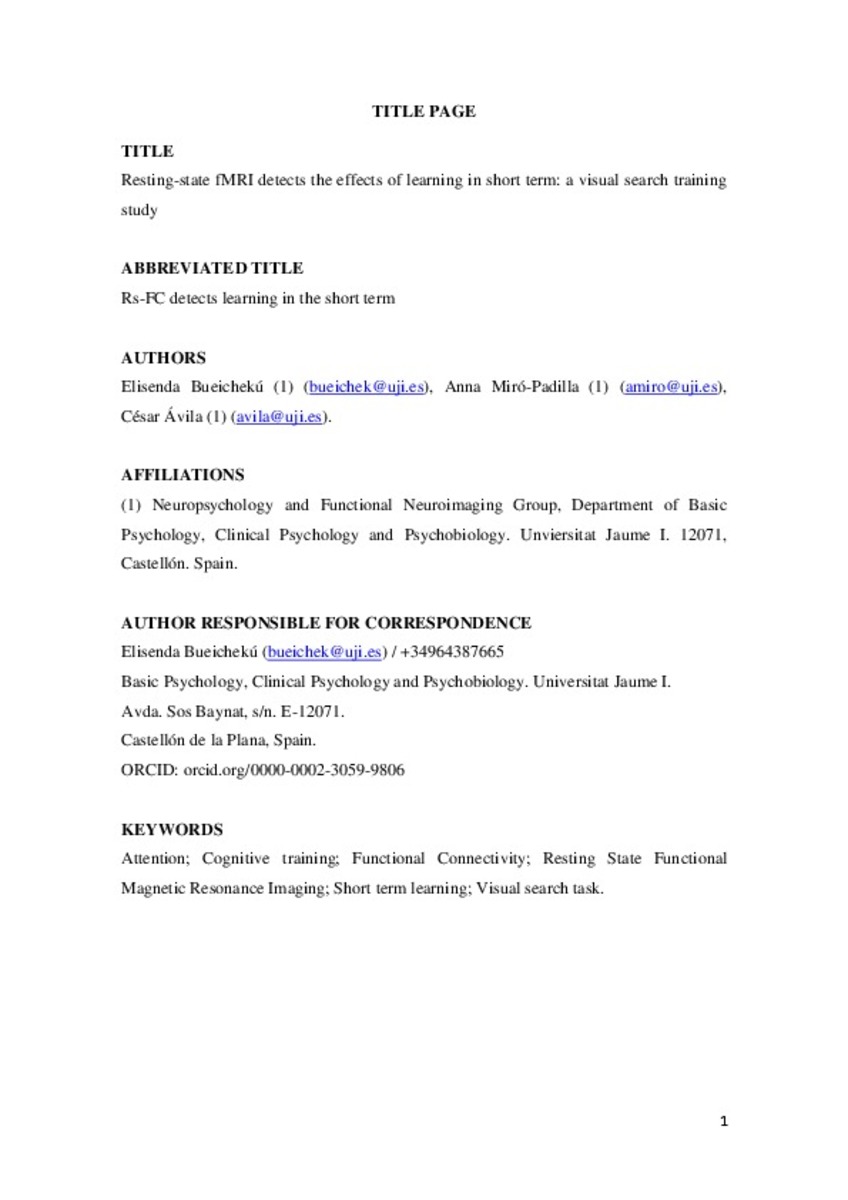Mostrar el registro sencillo del ítem
Resting‐state fMRI detects the effects of learning in short term: A visual search training study
| dc.contributor.author | Bueichekú, Elisenda | |
| dc.contributor.author | Miró-Padilla, Anna | |
| dc.contributor.author | Avila, Cesar | |
| dc.date.accessioned | 2019-05-28T07:39:05Z | |
| dc.date.available | 2019-05-28T07:39:05Z | |
| dc.date.issued | 2019-06-15 | |
| dc.identifier.citation | BUEICHEKÚ, Elisenda; MIRÓ-PADILLA, Anna; ÁVILA RIVERA, César (2019). Resting‐state fMRI detects the effects of learning in short term: A visual search training study . Human Brain Mapping, v. 40, issue 9, p. 2787-2799 | ca_CA |
| dc.identifier.uri | http://hdl.handle.net/10234/182599 | |
| dc.description.abstract | Can resting-state functional connectivity (rs-FC) detect the impact of learning on the brain inthe short term? To test this possibility, we have combined task-FC and rs-FC tested before andafter a 30-min visual search training. Forty-two healthy adults (20 men) divided into no-contactcontrol and trained groups completed the study. We studied the connectivity between fourdifferent regions of the brain involved in visual search: the primary visual area, the right poste-rior parietal cortex (rPPC), the right dorsolateral prefrontal cortex (rDLPFC), and the dorsalanterior cingulate cortex (dACC). Task-FC showed increased connectivity between the rPPCand rDLPFC and between the dACC and rDLPFC from pretraining to posttraining for boththe control group and the trained group, suggesting that connectivity between these areasincreased with task repetition. In rs-FC, we found enhanced connectivity between theseregions in the trained group after training, especially in those with better learning. Whole brainindependent component analyses did not reveal any change in main networks after training.These results imply that rs-FC may not only predict individual differences in task performance,but rs-FC might also serve to monitor the impact of learning on the brain after short periodsof cognitive training, localizing them in brain areas specifically involved in training. | ca_CA |
| dc.format.extent | 13 p. | ca_CA |
| dc.format.mimetype | application/pdf | ca_CA |
| dc.language.iso | eng | ca_CA |
| dc.publisher | Wiley | ca_CA |
| dc.relation.isPartOf | Human brain mapping (2019), v. 40, issue 9 | ca_CA |
| dc.rights.uri | http://rightsstatements.org/vocab/CNE/1.0/ | * |
| dc.subject | Attention | ca_CA |
| dc.subject | Cognitive training | ca_CA |
| dc.subject | Functional connectivity | ca_CA |
| dc.subject | Resting-state functional magneticresonance imaging | ca_CA |
| dc.subject | Short-term learning | ca_CA |
| dc.subject | Visual search task | ca_CA |
| dc.title | Resting‐state fMRI detects the effects of learning in short term: A visual search training study | ca_CA |
| dc.type | info:eu-repo/semantics/article | ca_CA |
| dc.identifier.doi | https://doi.org/10.1002/hbm.24560 | |
| dc.relation.projectID | 1) Spanish Department of Economy and Competitiveness, Grant/Award Numbers: PSI2013‐47504‐R, PSI2016‐78805‐R; 2) Universitat Jaume I, Grant/Award Number: P1•1B2013‐63; | ca_CA |
| dc.rights.accessRights | info:eu-repo/semantics/restrictedAccess | ca_CA |
| dc.relation.publisherVersion | https://onlinelibrary.wiley.com/doi/10.1002/hbm.24560 | ca_CA |
| dc.contributor.funder | 1) European Social Fund; 2) Generalitat Valenciana | ca_CA |
| dc.type.version | info:eu-repo/semantics/publishedVersion | ca_CA |
Ficheros en el ítem
Este ítem aparece en la(s) siguiente(s) colección(ones)
-
PSB_Articles [1302]
Articles de publicacions periòdiques







